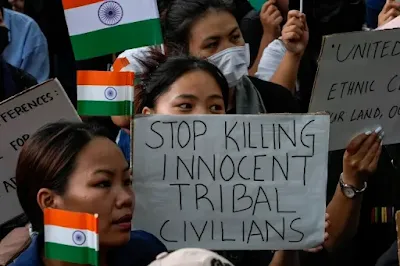At least ten people have been killed and a dozen injured in the latest clashes between members of rival ethnic groups in India’s northeastern state of Manipur, police said, as security forces pressed on with a hunt for illegal weapons.
Violence between members of the Kuki ethnic group, who mostly live in the hills, and Meiteis, the dominant community in the lowlands, erupted on May 3, sparked by resentment over economic benefits and quotas in government jobs and education reserved for hill people.
Security forces rushed to Khamenlok village in Manipur state’s Kangpokpi district after clashes broke out Tuesday night between the Kuki and Meitei communities, said L Sushindro, a state government minister.
Police found nine bodies early on Wednesday, a police officer said on condition of anonymity as he was not authorised to talk to reporters. Three people have been reported missing, the officer said.
Members of the Kuki tribe protesting against the violence in New Delhi [File: Manish Swarup/AP Photo]
K Shivakanta Singh, a senior police official in the state capital of Imphal, told reporters that a gun battle between rival factions erupted on Tuesday and went on for hours.
“We have reports of at least nine deaths and 10 injured so far,” Singh said. “The situation remains volatile.”
Federal security force reinforcements have been sent to the state and they have been searching for illegal weapons.
According to Indian media reports, at least 100 people have been killed and more than 40,000 displaced since May 3 in the remote state on the Myanmar border that is governed by Prime Minister Narendra Modi’s Bharatiya Janata Party (BJP).
Thousands of homes have been burned and shops and businesses vandalised.
The Indian Express newspaper reported that a day-long relaxation in a curfew in the area was reduced to four hours following the latest violence.
Civil society organisations from the Meitei and Kuki communities have refused to join a peace committee set up by the federal government to broker peace. The Meiteis are Hindus while rival groups, including the Kuki and other tribes, are mostly Christian and mainly live in the surrounding hill districts.
Two-thirds of the state’s 2.5 million people live in a valley that comprises roughly 10 percent of the state’s total area. Ethnic Muslims constitute about 8 percent of the state’s population.
On May 3, members of the minority hill tribes including the Kuki launched a protest against the possible extension of their benefits to the dominant Meiteis.
Meiteis account for half of Manipur’s population and extending limited affirmative action quotas to them would mean they would get a share in education and government jobs reserved for Kukis and others.
The benefits, which fall under a scheme for Scheduled Tribes recognised by the constitution, include the right to farm on forest land and cheap bank loans.
Minority hill community leaders say the Meitei community is comparatively well-off and that granting them more privileges would be unfair. But the Meiteis say employment quotas and other benefits for tribespeople would be protected.
Manipur also shares a nearly 400km (250-mile) border with Myanmar and a coup there in 2021 pushed thousands of refugees into the Indian state.
Kukis share ethnic lineage with Myanmar’s Chin community and Meiteis feared they would be outnumbered by the arrival of the refugees.


